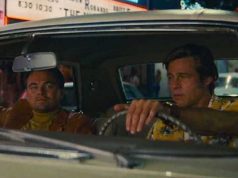Federico Fellini’s 1963 film “8 1/2” won the foreign-language Oscar, revealed Fellini’s newfound fascination with the subconscious, and inspired countless cineastes to look more deeply at European movies. It was also, inexplicably, turned into a Broadway musical, a smash hit called “Nine” that ran from 1982-84 and again in 2003. Now, as is the custom, that musical has been turned back into a movie — a rather dull, listless one that doesn’t even capture the spirit of the Broadway version, let alone Fellini’s original.
It was directed by Rob Marshall, whose “Chicago” won the Oscar for best picture of 2002 and ushered in a new era of movie musicals. (The results have been mixed, but that’s not “Chicago’s” fault.) With “Chicago,” Marshall overcame the audience’s aversion to characters spontaneously bursting into song by staging all the musical numbers as fantasy sequences: It’s easier to buy that someone would imagine singing than that he or she would actually do it. Marshall uses the same technique in “Nine” — indeed, this frequently resembles “Chicago,” only without the energy or wit — but so cautious was he about alienating musical-wary viewers that he cut out half the show’s songs. Which is a very strange way to go about making a musical.
Then again, the cutting may have been an act of mercy. Marshall’s skills as a director aside, “Chicago” benefited from the fact that it had a dozen catchy tunes already built in to it. The songs of “Nine,” on the other hand, written by Maury Yeston, are mostly stiff and forgettable. I doubt you’ll leave the theater humming any of them.
Set in 1965, the story, which feels like it’s jogging in place a lot of the time, is about Guido Contini (Daniel Day-Lewis), a fabulously popular Italian filmmaker who’s supposed to start production on a new movie in two weeks. The movie will be ambitiously titled “Italia.” One slight problem: There is no script. Guido doesn’t even know what the subject matter will be. Utterly blocked, he has retreated to a spa to rest his nerves, only to be followed by his producers and crew members, demanding that he get to work.
There are numerous women in Guido’s life, both past and present. He’s married to Luisa (Marion Cotillard) but has a mistress named Carla (Penelope Cruz), both of whom eventually show up at the spa. He has visions of his dead mother (Sophia Loren) and frequent memories of his childhood, when he and the other boys would pay the feral prostitute Saraghina (Stacy “Fergie” Ferguson) to dance for them. Guido’s faithful, matronly costume designer (Judi Dench) gives advice. His leading lady, Claudia (Nicole Kidman), is delighted to be in “Italia” but wonders why she hasn’t gotten a script yet. An American reporter named Stephanie (Kate Hudson) seeks his company.
All the women love Guido! He’s a genius! People adore his work, especially “the early films” (an inside joke about Fellini’s career). But what “Nine” fails to tell us is why. Why does Guido’s wife — played by Cotillard in the film’s only excellent performance — put up with him? Why does his mistress — played by Cruz in the film’s sexiest performance — stay with him? Why do all these women lavish praise and kisses on him? If he is supposed to be charismatic, that is not conveyed by Day-Lewis, who lacks the light touch necessary to play a man this beloved. (Raul Julia and Antonio Banderas played him on Broadway.)
Each character I’ve mentioned sings one song; a lucky few get a second one. These numbers are lavish and eye-catching, resembling a more chaotic version of “Chicago,” and they tend to be lively. They just don’t add up to much. They don’t progress the story, because there is no story to progress. A film about a man who is spinning his wheels runs the risk of spinning its wheels, too, and that’s exactly what happens here. “Nine” feels like a series of loosely related vignettes, not a cohesive whole, and it wears thin long before the final curtain.
C (1 hr., 52 min.; )





